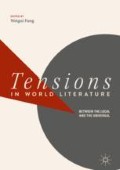Abstract
Taking its point of departure from a curious remark of Franz Kafka concerning the comparability of the Great Wall of China and the Tower of Babel, Peter Fenves’ chapter investigates a series of often-overlooked passages in the work of such exemplary German-Jewish writers as Martin Buber, Franz Rosenzweig, Walter Benjamin, and Gershom Scholem, in addition to Kafka. The general aim of the chapter consists in sketching a schema of cultural connectivity in which the concept of connection is neither subsumed under the category of cause nor dependent on evidence of reciprocity. The author seeks to show a range of experiments in cultural connectivity, whereby certain Jewish messianic traditions are reflected through the text of the Daodejing and the figure of Laozi.
Access this chapter
Tax calculation will be finalised at checkout
Purchases are for personal use only
Notes
- 1.
Franz Kafka, Gesammelte Werke in zwölf Bänden, ed. Hans-Gerd Koch (Frankfurt am Main: Fischer, 1994), 6: 69.
- 2.
Kafka , Gesammelte Werke, 6: 70.
- 3.
Lao-Tzi, Die Bahn und der rechte Weg des Lao-Tzi, trans. Alexander Ular (Leipzig: Insel, 1903), 30. I provide no translation only because it is unnecessary to translate this particular translation.
- 4.
Martin Buber, Reden und Gleichnisse des Tsuang-Tse, ed. Martin Buber (Leipzig: &, 1910), 82–122; reprinted under the title “Die Lehre vom Tao” in Die Rede, die Lehre und das Lied: Drei Beispiele (Leipzig: Insel Verlag, 1917), 35–94. All quotations in this chapter are drawn from the 1917 edition that includes the title.
- 5.
See Martin Buber, Die Geschichten des Rabbi Nachmann (Frankfurt: Rütter and Loening, 1906).
- 6.
Buber , “Das Lehre vom Tao,” 40.
- 7.
Buber , “Das Lehre vom Tao,” 53.
- 8.
Buber , “Das Lehre vom Tao,” 75.
- 9.
See Martin Buber, Drei Reden über das Judentum (Frankfurt am Main: Rütten & Loening, 1911). (The original version of “Die Lehre vom Tao” was delivered in lectures at the very same time.)
- 10.
Buber , “Das Lehre vom Tao,” 93.
- 11.
Gershom Scholem, Tagebücher, nebst Aufsätzen und Entwürfen bis 1923, ed. Karlfried Gründer, Herbert Kopp-Oberstebrink und Friedrich Niewöhner unter Mitwirkung von Karl E. Grözinger (Jüdischer Verlag: Frankurt am Main, 1995–2000), 1: 51.
- 12.
Scholem , Tagebücher, 1: 133; Scholem later indicates in his diary that Benjamin owned a copy of the other major edition of the Daodejing in this period, namely Taoteking: Das Buch des Alten vom Sinn und Leben, trans. Richard Wilhelm (Diederich: Jena: 1911); see Scholem , Tagebücher, 1: 133.
- 13.
Scholem , Tagebücher, 2: 146.
- 14.
Walter Benjamin, Gesammelte Schriften, ed. Rolf Tiedemann and Hermann Schweppenhäuser (Frankfurt am Main: Suhrkamp, 1972–91), 2: 96.
- 15.
Benjamin uses the phrase “frontal assault” in a letter to Hugo von Hofmannstahl; see Walter Benjamin, Gesammelte Briefe, ed. Christoph Gödde and Henri Lonitz (Frankfurt am Main: Suhrkamp, 1995–), 2: 410.
- 16.
Ku Hung-Ming , Chinas Verteidigung gegen europäische Ideen, trans. Richard Wilhelm, intro. Alfons Pacquet (Jena: Diederich, 1911).
- 17.
Benjamin, Gesammelte Briefe, 1: 77.
- 18.
See Benjamin, Gesammelte Briefe, 1: &.
- 19.
Benjamin, Gesammelte Schriften, 2: 96; Taoteking, 85. A standard English translation can be found in D. C. Lau’s edition: “Though adjoining states are within sight of one another,/ And the sound of dogs barking and cocks crowing in one state can be heard in another,/ yet the people of one state will grow old and die without having had any dealings with those of another” (Tao Te Ching, trans. D. C. Lau [New York: Penguin, 1963], 80).
- 20.
See Benjamin, Gesammelte Schriften, 2: 1254. The phrase, so it seems, stems from Brecht; but it may have been suggested by Benjamin.
Author information
Authors and Affiliations
Corresponding author
Editor information
Editors and Affiliations
Rights and permissions
Copyright information
© 2018 The Author(s)
About this chapter
Cite this chapter
Fenves, P. (2018). Experiments in Cultural Connectivity: Early Twentieth-Century German-Jewish Thought Meets the Daodejing. In: Fang, W. (eds) Tensions in World Literature. Palgrave Macmillan, Singapore. https://doi.org/10.1007/978-981-13-0635-8_11
Download citation
DOI: https://doi.org/10.1007/978-981-13-0635-8_11
Published:
Publisher Name: Palgrave Macmillan, Singapore
Print ISBN: 978-981-13-0634-1
Online ISBN: 978-981-13-0635-8
eBook Packages: Literature, Cultural and Media StudiesLiterature, Cultural and Media Studies (R0)

